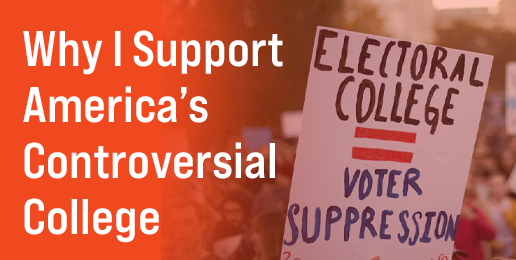
Last time, we discussed the arrogance seeping from a recent call to abolish the electoral college. In a press release from last December, U.S. Senator Dick Durbin (D-IL) essentially claimed to know better than America’s founding generations and their “18th-century invention.”
Before actually refuting his argument, I couldn’t resist writing that previous article about the historical arrogance that I wish modern Americans would toss in the wastebasket. I had fun writing it, and I hope you have fun reading it if you haven’t already.
Okay, now down to business. We’ve established that our forefathers probably had good reasons for what they did. So what are some of the good reasons behind the electoral college? (I’m indebted to this excellent Prager University video for some of the following points.)
Recall that our nation was not one giant country that divided itself up into 50 smaller jurisdictions. Our nation was originally a loose collection of independent colonies that banded together into a union. They did not lose their individuality when this happened; there’s a reason our own country’s name is the somewhat lackluster yet quite anatomically correct appellation “the United States.”
Our founding fathers took great pains to ensure that the new nation would still be composed of distinct states handling much of their own affairs, and not just an amorphous pool of national citizens living in nominally different jurisdictions.
The general idea was that the national government would do what the states could not do on their own, not that the national government would take over whatever state operations it pleased.
This, in turn, allows a great deal of government operations to take place on the state level and be more finely tuned to the desires of each particular constituency. Think of the nation as a screen with 50 pixels, each of which can adjust independently, rather than one giant homogenous pixel. To complete the metaphor, it produces high-resolution political accountability.
Yet, in order for us to truly have this balance of state and federal government, then, the states themselves need to have representation. If it’s just up to the people and the feds, the states will eventually wither into nothing.
It’s interesting how Durbin, Schatz, and Welch are all U.S. Senators, serving in a legislative body that includes exactly two members per state, no matter how large or small. They each represent their whole state all at once in what is basically a version of a “winner-takes-all” election.
Would Durbin turn around and start criticizing the institution he himself serves in? Would he complain about how undemocratic his own office is, compared to the House of Representatives? Is he guilty of disenfranchising anyone? Or would he recognize that his own institution is there to serve a purpose besides merely representing the people—representing state interests as well?
So look at it this way: Right now, a national presidential election is basically a collection of 51 separate state-wide presidential elections (counting D.C.). Each state determines its own election code and runs its own elections to contribute to the whole.
A national popular vote would begin to erase those differences and remove the principle of state-sovereignty that allows our nation to be so uniquely responsive to the people.
This is not to mention that, when the election is split up 51 different ways, it’s significantly harder to steal it!
You couldn’t just meddle with elections anywhere in the country; you would have to pick the right states to tamper with, and tamper with them significantly enough to swing them completely.
If we switched to a national popular vote, however, a little bit of fraud here and there could affect the election everywhere.
Finally—and this may be one of the most significant ways that the principle of state sovereignty influences the country—the electoral system actually helps small states matter. The seven main swing states last election did include some pretty populated ones (Pennsylvania was #5 in population, and Georgia was #8), but also some others far down on the list (Wisconsin was #20, and Nevada was #32).
Can you imagine Nevada actually mattering to the nation if it were just a popular vote? This system forces presidential candidates to build coalitions that actually include the interests of smaller states—and the people in them, who live much different lives than those in the large, urbanized ones.
If we switched to a national popular vote, on the other hand, smart presidential candidates would only focus on the places with the most people—i.e., the big cities. And it so happens that people who live in big cities all live a certain kind of lifestyle and tend to have certain values much different from those in other walks of life.
I think it’d only be a matter of time before both political parties—to stay viable as contenders for the White House—would both tailor their platforms to appeal to different flavors of the urban worldview.
Let’s face it: That means we’d just have two progressive parties, and we might as well forget about what the old ranchers out in Nevada ever thought about life.
And I thought we valued diversity around here.























